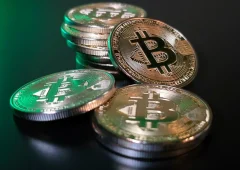Retail Investors Pile into Stocks Amid Market Chaos: Betting on a Rebound?
05.04.2025 10:00 2 min. read Alexander Stefanov
Retail investors are making bold moves amid the massive market downturn sparked by new tariffs introduced by President Donald Trump.
As market volatility shakes the financial landscape, everyday investors are seizing the opportunity to buy stocks at lower prices.
According to a recent client note from JPMorgan Chase, retail investors funneled around $4.7 billion into the stock market on Thursday, marking the most significant single-day investment from this group in a decade. Reuters reports that this surge reflects a calculated attempt by retail traders to capitalize on the dip.
Most of the buying activity is concentrated in small-cap technology stocks, which institutional investors have been increasingly skeptical about. This divergence highlights a clear difference in strategy between retail and institutional market players.
Among the retail crowd’s top picks are Mag 7 stocks, particularly Nvidia (NVDA) and Amazon (AMZN), while Tesla (TSLA) has seen more selling than buying from the same group. This selective buying approach suggests that retail investors are being strategic about where they place their bets, despite the broader market uncertainty.
The backdrop to this retail buying spree is a sharp market decline, with over $5 trillion wiped off U.S. markets in just two days. The trigger: Trump’s sweeping tariff hikes, which have fueled concerns about a prolonged trade war and potential global recession. As institutions become more cautious, retail traders appear to be taking a contrarian stance, hoping to catch a rebound when the dust settles.
-
1
U.S. Bank Advises Clients to Drop These Cryptocurrencies
29.06.2025 10:00 2 min. read -
2
Chinese Tech Firms Turn to Crypto for Treasury Diversification
26.06.2025 17:00 1 min. read -
3
FTX Halts Recovery Payments in 49 Countries: Here Is the List
04.07.2025 18:00 2 min. read -
4
What Are the Key Trends in European Consumer Payments for 2024?
29.06.2025 8:00 2 min. read -
5
What Brian Armstrong’s New Stats Reveal About Institutional Crypto Growth
29.06.2025 15:00 2 min. read
U.S. Dollar Comes Onchain as GENIUS Act Ushers in Digital Era
In a statement that marks a major policy shift, U.S. Treasury Secretary Scott Bessent confirmed that blockchain technologies will play a central role in the future of American payments, with the U.S. dollar officially moving “onchain.”
JPMorgan Lawsuit Threatens Crypto Access and Open Banking Rights
JPMorgan and other major U.S. banks are under fire for a lawsuit aimed at dismantling the Consumer Financial Protection Bureau’s (CFPB) newly established “Open Banking Rule.”
Greed Holds as Market Momentum Builds: What is the Market Sentiment
The crypto market remains firmly in “Greed” territory, with CoinMarketCap’s Fear & Greed Index clocking in at 69/100 on July 19. Despite a modest 24-hour dip from 71, the index has now held above 60 for 11 consecutive days.
Top 7 Crypto Project Updates This Week
The crypto industry saw major advancements this past week across DeFi, NFT, Layer 2, and AI-powered platforms.
-
1
U.S. Bank Advises Clients to Drop These Cryptocurrencies
29.06.2025 10:00 2 min. read -
2
Chinese Tech Firms Turn to Crypto for Treasury Diversification
26.06.2025 17:00 1 min. read -
3
FTX Halts Recovery Payments in 49 Countries: Here Is the List
04.07.2025 18:00 2 min. read -
4
What Are the Key Trends in European Consumer Payments for 2024?
29.06.2025 8:00 2 min. read -
5
What Brian Armstrong’s New Stats Reveal About Institutional Crypto Growth
29.06.2025 15:00 2 min. read


